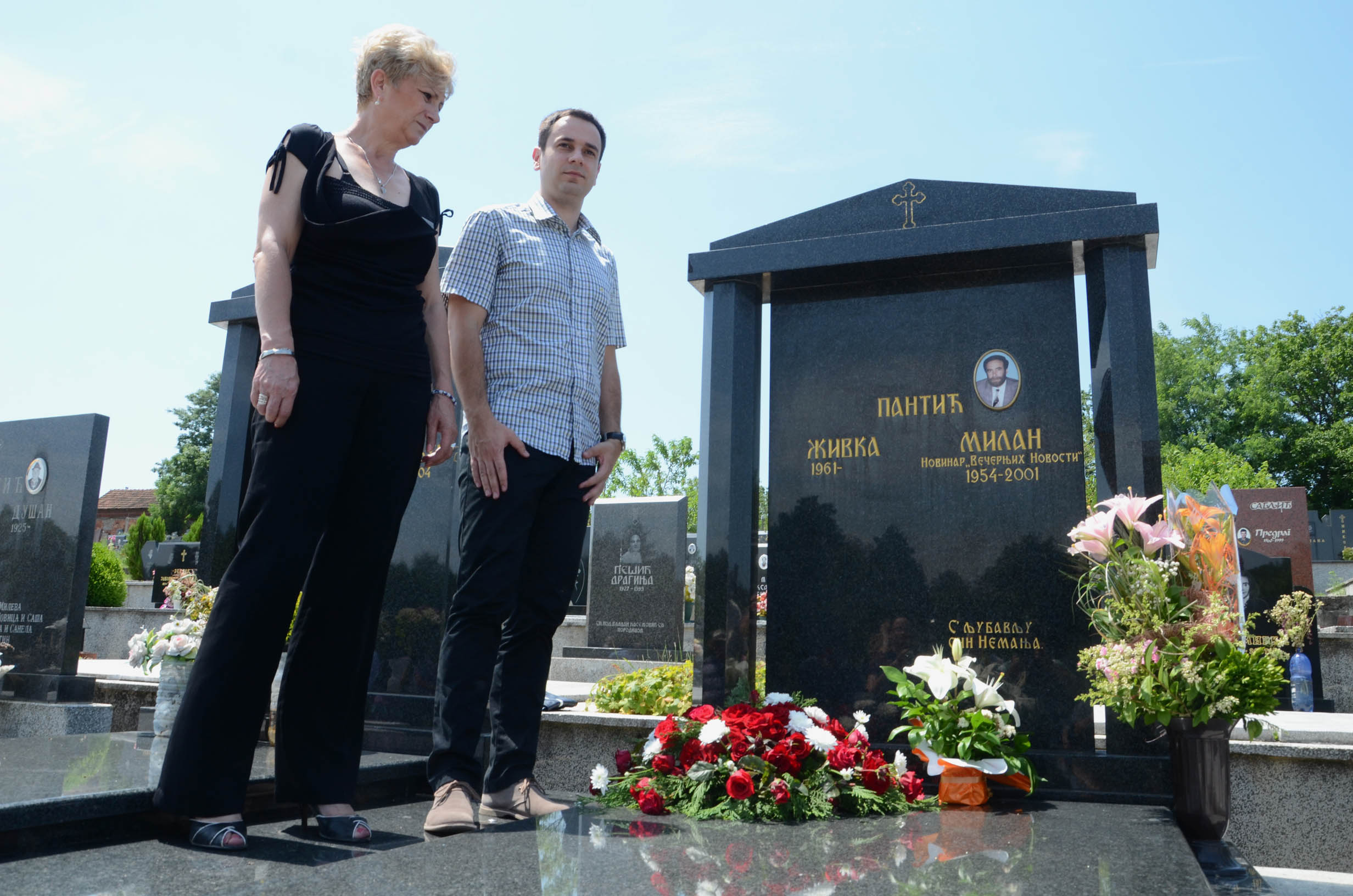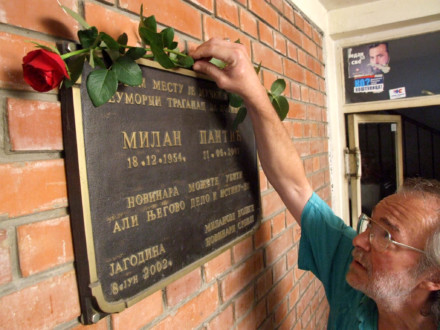11 June 2001
Jagodina, Serbia
Milan Pantić
Profession
Media
Motive
Exposure of illegal activity
Whistleblowing


Adolfo Olivas


Ahmed Divela


Amit Jethwa


Artan Cuku


Babita Deokaran


Bayo Ohu


Berta Cáceres


Bhupendra Veera


Bill Kayong


Boris Nemtsov


Boško Buha


Chai Boonthonglek


Charl Kinnear


Chut Wutty


Chynybek Aliev


Cihan Hayirsevener


Daphne Caruana Galizia


Darío Fernández


Derk Wiersum


Deyda Hydara


Édgar Quintero


Edmore Ndou


Edwin Dagua


Federico Del Prete


Fernando Villavicencio


Gezahegn Gebremeskel


Gilles Cistac


Habibur Mondal


Igor Alexandrov


Jacob Juma


Ján Kuciak


Javier Valdez


Joannah Stutchbury


José Ángel Flores


Jules Koum Koum


Kem Ley


Luis Marroquín


Mahamudo Amurane


Marcelo Rivera


María Elena Ferral Hernández


Marielle Franco


Milan Pantić


Milan Vukelić


Muhammad Khan


Nelson García


Nihal Perera


Oliver Ivanović


Orel Sambrano


Perween Rahman


Peter R. de Vries


Rajendra Singh


Salim Kancil


Sandeep Sharma


Sikhosiphi Radebe


Slaviša Krunić


Soe Moe Tun


Victor Mabunda


Virgil Săhleanu


Wayne Lotter


Yuniol Ramírez


Zezico Guajajara
11 June 2001
Jagodina, Serbia
Profession
Media
Motive
Exposure of illegal activity
Whistleblowing
On the morning of 11 June 2001, Serbian journalist Milan Pantić went to buy some milk and a loaf of bread. He returned to his home in the Serbian city of Jagodina, arriving at the entrance to his apartment building just before 8 a.m. As he entered the front door on Branka Radicevica Street, Pantić was attacked and fatally hit with a blunt object. Reportedly, eyewitnesses saw two attackers fleeing the scene.
Some 18 years later, the case remains a mystery.
Pantić was a correspondent for the Serbian daily, Večernje Novosti (meaning ‘evening news’). He was born in 1954 in a small town near Rekovac in central Serbia. He had previously worked at a local newspaper called Novi Put (‘new path’). He was investigating shady privatization deals in Jagodina, which were widely believed to have been facilitated by corruption.
Serbian strongman Slobodan Milošević was toppled after his defeat in the 2000 elections, a few months before Pantić’s killing amid massive anti-government protests. Milošević’s legacy – one of mass murders, sanctions, Serbian isolation, war and thousands of refugees – was still very vivid. At the time, Pantić was writing about corrupt deals between the Jagodina brewery company, a cement factory, and various politicians and businessmen.
In an article published by Večernje Novosti on 10 June 2009, it was recalled that prior to the murder, Pantić had published a series of articles on economic crime in the district. The newspaper later created a journalistic award for courage and named it after Pantić. He was described as exceptionally committed, and someone who put his job first at all times. The newspaper explained that Pantić didn’t speak much about the topics he was working on, ‘for understandable reasons’. But the impact of his investigative reporting was ‘seen every morning in the papers’.
Aleksandar Dobrosavljević, a then colleague of Pantić’s, recalled that Pantić did not visit local bars for his leads and was an introverted person. ‘Sometimes he would smile when he was asked: “How did you get this?” But he never revealed his sources – not even to close friends.’
His wife, Zivka, said that before Pantić was killed, he’d told his colleagues that he was receiving threats on his phone. The family eventually changed their home number. After the killing, Zivka learnt from the police that her husband had been followed and that an unknown man in a car had threatened Pantić.
Serbia’s commission for investigating killings of journalists was established by the government in 2014 to help solve difficult murder cases in cooperation with the Serbian Interior Ministry and the state prosecuting authority. Among these cases is Milan Pantić’s killing.
‘We informed the public about everything that the investigation showed, although the findings were not processed to the end. It is important to note that this may have made it difficult to work and gather evidence that is valid for the process,’ founder and chairman, Veran Matić, explained. In 2018, the commission said an investigation had revealed a possible motive and identified murder suspects in the Pantić case.
Asked why, to date, no arrests had been made, Matić said that the passing of time was one of the aggravating circumstances. He explained that the law-enforcement authorities failed to properly collect evidence from the scene, and that telephone conversations from the area where the murder occurred had not been checked.
He added that the police had also failed to interview possible witnesses immediately after the killing. ‘There are a lot of procedural actions that could have made it easier to prosecute.’ Yet, despite the impediments, Matić believes that there is sufficient political will for the case to be solved.
In an article published in December 2000, Pantić wrote that senior management at some hundred state-owned companies had changed following the democratic transformation that occurred in Serbia in October that year. In Serbia, it is common for new directors to be appointed in state-owned companies and institutions whenever major political changes occur. The majority of those appointed then, as now, were loyal to the ruling party.

Family members visit Milan Pantić's grave

A memorial plaque in honour of Milan Pantić
Following the assassination of Serbian Prime Minister Zoran Djindjić in March 2003, police launched Operation Sabre. As part of the operation, Jovan Stojanović, the head of Jagodina brewery, and Živojin Trifunović, the former local police chief, were taken into custody. At a commemoration service for Pantić’s murder in 2015, the commission for investigating killings of journalists said the investigation indicated that his murder had been ordered by people connected to the Jagodina brewery.
In 2016, Matić explained that police had interrogated a suspect named Dragan Antic in Germany in connection with the case. A Bosnian citizen living in Munich, Antic was a member of the Tigers, a notorious paramilitary unit led by Serbian chief Željko Ražnatović. Also known as ‘Arkan’, Ražnatović was accused of war crimes and shot dead in January 2000. Although Antic denied involvement, it emerged that he had changed his surname (formerly Tesic) because of his past.
Another person connected to Arkan’s Tigers is Dragan Marković. Marković is commonly known by the nickname of Palma (meaning ‘palm tree’). The mayor of Jagodina from 2004 to 2012, and also called ‘the chief of Jagodina’, Palma is known for his pro-Russian and homophobic rhetoric, and has strong connections to the Serbian Orthodox Church.
He also heads the United Serbia political party, a junior coalition member of the ruling Progressive Party, which is led by Serbian President Aleksandar Vučić. Palma’s party is aligned with the Socialist Party of Serbia, led by Foreign Affairs Minister, Ivica Dačić. Palma, who fought with the Tigers in the 1990s, was elected as an MP in the Serbian Parliament in 2001. He also owns Palma’s Tigers, a kickboxing club where one of the fighters is Željko Ražnatović’s son, Veljko.
Dobrosavljević believes that if the political will for the case to be solved really existed, there would be progress in the investigation. ‘Everyone knew Milan was getting threats – mostly by telephone. He accepted it as part of the job. He was not a complicated man and did not complain much.’
When he arrived at the murder scene, Dobrosavljević saw Pantić’s body in pool of blood. ‘When I reached the building entrance, I was shaking. Beside him was a bag with a litre of milk and bread.’


8 April 2017
Tirana, Albania
Artan Cuku


27 February 2015
Moscow, Russia
Boris Nemtsov


10 June 2002
Belgrade, Serbia
Boško Buha


19 December 2009
Bandirma, Turkey
Cihan Hayirsevener


16 October 2017
Bidnija, Malta
Daphne Caruana Galizia


18 September 2019
Amsterdam, Netherlands
Derk Wiersum


18 February 2002
Casal di Principe, Italy
Federico Del Prete


1 July 2001
Slavyansk, Ukraine
Igor Alexandrov


21 February 2018
Veľká Mača, Slovakia
Ján Kuciak


6 November 2007
Banja Luka, Bosnia and Herzegovina
Milan Vukelić


16 January 2018
North Mitrovica, Kosovo
Oliver Ivanović


15 July 2021
Amsterdam, The Netherlands
Peter R. de Vries


22 April 2019
Banja Luka, Bosnia and Herzegovina
Slaviša Krunić


7 September 2000
Iași, Romania
Virgil Săhleanu